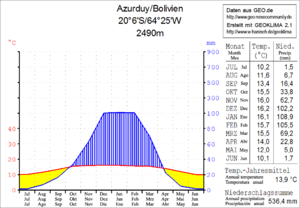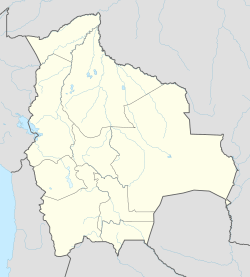Azurduy Municipality facts for kids
Quick facts for kids
Azurduy Municipality
|
|
|---|---|
|
Municipality
|
|

Climate chart in the Walter and Lieth format, metric, °C und millimeters, made with Geoklima 2.1
|
|
| Country | |
| Department | Chuquisaca Department |
| Province | Azurduy Province |
| Seat | Villa Azurduy |
| Elevation | 8,200 ft (2,500 m) |
| Population
(2012)
|
|
| • Total | 10,594 |
| Time zone | UTC-4 (BOT) |
The Azurduy Municipality is a local government area in Bolivia. It is the first municipal section of Azurduy Province in the Chuquisaca Department. The main town and administrative center is Villa Azurduy.
In 2012, about 10,594 people lived here. Many people in Azurduy Municipality face economic challenges. In 2001, there were only seven vehicles, including trucks, in the whole municipality.
Contents
Geography of Azurduy
This municipality is located in the mountains of the Cordillera Oriental, which is part of the Andes mountain range. The Pilcomayo River forms its western border. The mountains and rivers in this area generally run from north to south.
Because it is high up in the mountains, Azurduy Municipality has big temperature changes between day and night. The average temperature for the whole year is about 14°C (57°F). In June and July, the average is around 10°C (50°F), while in December and January, it's about 16°C (61°F).
The area does not get much rain, with only about 550 mm (22 inches) per year. The driest months are from May to August, with less than 10 mm (0.4 inches) of rain each month. The most rain falls between December and February, with 100 to 110 mm (4 to 4.3 inches) per month.
Climate in Azurduy
| Climate data for Azurduy, elevation 2,530 m (8,300 ft), (1988–2012) | |||||||||||||
|---|---|---|---|---|---|---|---|---|---|---|---|---|---|
| Month | Jan | Feb | Mar | Apr | May | Jun | Jul | Aug | Sep | Oct | Nov | Dec | Year |
| Record high °C (°F) | 32.5 (90.5) |
31.5 (88.7) |
31.5 (88.7) |
32.5 (90.5) |
33.0 (91.4) |
32.5 (90.5) |
32.0 (89.6) |
33.0 (91.4) |
34.5 (94.1) |
36.0 (96.8) |
33.0 (91.4) |
32.0 (89.6) |
36.0 (96.8) |
| Mean daily maximum °C (°F) | 22.2 (72.0) |
21.9 (71.4) |
21.6 (70.9) |
22.3 (72.1) |
22.4 (72.3) |
22.9 (73.2) |
22.4 (72.3) |
23.4 (74.1) |
22.9 (73.2) |
23.3 (73.9) |
22.9 (73.2) |
23.0 (73.4) |
22.6 (72.7) |
| Daily mean °C (°F) | 16.2 (61.2) |
16.1 (61.0) |
15.7 (60.3) |
15.3 (59.5) |
13.7 (56.7) |
12.9 (55.2) |
12.3 (54.1) |
13.5 (56.3) |
14.1 (57.4) |
15.8 (60.4) |
16.0 (60.8) |
16.6 (61.9) |
14.9 (58.7) |
| Mean daily minimum °C (°F) | 10.3 (50.5) |
10.3 (50.5) |
9.7 (49.5) |
8.4 (47.1) |
5.0 (41.0) |
2.9 (37.2) |
2.2 (36.0) |
3.7 (38.7) |
5.2 (41.4) |
8.4 (47.1) |
9.2 (48.6) |
10.3 (50.5) |
7.1 (44.8) |
| Record low °C (°F) | −0.5 (31.1) |
3.0 (37.4) |
−3.5 (25.7) |
−2.5 (27.5) |
−8.0 (17.6) |
−9.0 (15.8) |
−12.0 (10.4) |
−6.5 (20.3) |
−9.5 (14.9) |
−2.0 (28.4) |
−1.5 (29.3) |
1.2 (34.2) |
−12.0 (10.4) |
| Average precipitation mm (inches) | 156.1 (6.15) |
130.5 (5.14) |
107.0 (4.21) |
33.7 (1.33) |
9.5 (0.37) |
2.2 (0.09) |
3.1 (0.12) |
6.6 (0.26) |
22.2 (0.87) |
52.3 (2.06) |
68.3 (2.69) |
139.1 (5.48) |
730.6 (28.77) |
| Average precipitation days | 14.1 | 14.2 | 12.3 | 6.9 | 3.7 | 1.7 | 1.6 | 2.4 | 5.0 | 8.9 | 11.1 | 14.0 | 95.9 |
| Average relative humidity (%) | 77.8 | 79.8 | 80.9 | 78.0 | 71.8 | 65.6 | 63.5 | 63.7 | 67.5 | 71.3 | 74.3 | 76.1 | 72.5 |
| Source: Servicio Nacional de Meteorología e Hidrología de Bolivia | |||||||||||||
Azurduy Municipality shares borders with:
- To the north: Tarvita Municipality (also in Azurduy Province) and El Villar Municipality (Tomina Province)
- To the east: Hernando Siles Province
- To the west and south: Nor Cinti Province
There are 132 small communities in the municipality, with 36 villages. Only eight of these villages can be reached by road.
Economy
Most people in Azurduy Municipality work in farming and raising animals. Some people also work in mining.
The main crops grown here are:
- Corn
- Wheat
- Potatoes
- Barley
- Peppers
Animals raised include:
- Sheep
- Cattle (cows)
- Goats
- Pigs
- Horses
- Poultry (chickens, etc.)
The People of Azurduy
Most of the people living in Azurduy Municipality are indigenous citizens, mainly of Quechuan background.
| Ethnic group | % |
|---|---|
| Quechua | 62.4 |
| Aymara | 0.1 |
| Guaraní, Chiquitos, Moxos | 0.1 |
| Not indigenous or declined to state | 37.3 |
| Other indigenous groups | 0.1 |
Population Changes
The number of people living in Azurduy Municipality has stayed about the same over the years:
- 1992: 10,818 people (from a census)
- 2001: 11,349 people (from a census)
- 2012: 10,594 people (from a census)
According to the 2001 census:
- About 61.4% of the people could read and write.
- The average life expectancy for a newborn was 57 years.
- About 9.3 out of every 100 babies did not survive their first year.
- 60.9% of the population spoke Spanish.
- 55.8% spoke Quechua.
- 90.3% of homes had electricity.
- However, 89.7% of homes did not have proper sanitation facilities.
Cantons
The municipality is divided into three smaller administrative areas called cantons:
- Las Casas Canton, with its main town in Torrecillas
- Azurduy Canton, with its main town in Villa Azurduy
- Antonio Lopez Canton, with its main town in San Antonio
See also
 In Spanish: Azurduy (municipio) para niños
In Spanish: Azurduy (municipio) para niños


